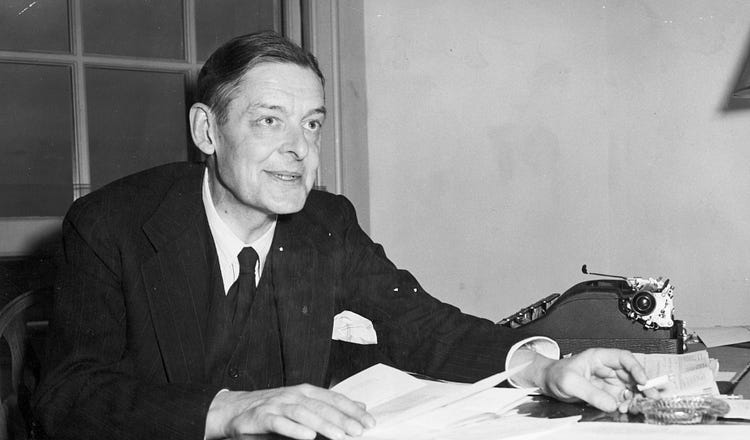
Last week, we announced “Things Worth Remembering,” a new column by Douglas Murray, who is sharing—every Sunday for the next year—a literary gem he has memorized and the story of how it shaped his life.
Your response, so far, has been overwhelming and is well summed up by this comment: “I need more of this kind of beauty and reaffirmation of the good, the love of things past.”
So here is Douglas once again. And if you want to want to listen to him read today’s piece, the opening of T. S. Eliot’s “Four Quartets,” just click below. —BW
Only a few writers will crop up here more than once, and only three will appear several times. To nobody’s surprise, one of these will be the greatest poet of the twentieth century: T. S. Eliot.
I will explain later how I first discovered that—like Shakespeare—I needed to live with this man. While the passage in my mind today is not the place from which I started with Eliot, it is the passage that for me opened the doorway into his poetry.
Earlier, I mentioned scholar George Steiner’s views on memory, but in my formative years there was another person who impressed upon me the necessity of keeping the best stuff up there. He was a very different man, from a very different tradition, and I suppose his name will resonate, or not, depending on age.
Terry Waite was an Anglican envoy who went to Lebanon in the 1980s to negotiate for the release of a number of Western hostages. The country had fallen apart to an almost unimaginable degree. Shia, Sunni, Druze, Christian—everyone had their own bloody games amid the hell of their land.
In the middle of this disaster, the abduction of a small number of Western hostages—including journalists—took up a lot of attention in the Western media. One of the militia groups trading in these precious bargaining chips was the unpromisingly named Islamic Jihad. Terry Waite was given the dangerous task of trying to free these captured people—at the request of the then-Archbishop of Canterbury, Robert Runcie (who later, with less fanfare, confirmed me into the Church of England).
Unfortunately, everything went wrong for Terry Waite. The hostage negotiators were not sincere—indeed, they broke a crucial part of the pact. In short, Waite went to free the hostages, only to become one. What he went through was, and is, unimaginable.

